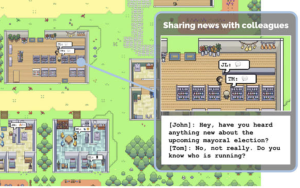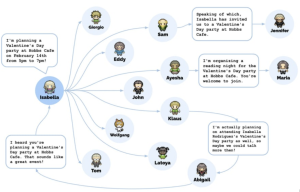Simulations have long played an important role in science – everything creating simulations around the formation of galaxies, the spread of infectious diseases, and the effectiveness of different aircraft designs.
But recent work by Google and Stanford University in simulating human-like agents now offers intriguing possibilities for management too.
What Google and Stanford have done is create an online town called Smallville, which on the surface looks much like the Sims video game.
Little “people” go around the town, living their virtual lives, and player(s) can interact with them as well as they change the design of the town.
But, what makes Smallville so different from earlier simulations is that the “people” (“agents” in AI-speak), are vastly more intelligent than previous games.
This is because they are powered by a large language model.
It means that now, the agents in Smallville may be so intelligent that we can run simulations that will provide insights into how to manage teams and organizations.
Could it tell us how to train managers?

The most obvious potential use of a Smallville-like simulation for management is in training leaders.
The town could be set up like a department, with different agents given jobs and goals.
The leader could then watch how the work unfolds and experiment by interacting with the agents in different ways.
For example, the leader could watch how the performance of a small team compares to a bigger one.
Now, I need to underline the phrase “potential use” because it hasn’t been demonstrated that the simulation would be accurate enough to be useful.
However, people are good at drawing lessons from simulations by comparing them to what happens in the real world even when the simulation isn’t that good.
Just like the city simulator SimCity inspires systems thinking, Smallville may inspire insights on how to manage a group of people.
New insights into management theory?
A more ambitious potential of Smallville could be to use it to get fresh insights into management theory in the same way that physicists get insights into galaxies with simulations.

For example, academics or consultancies could run a Smallville-like simulation using various types of organizational design to see what is best.
Rather than plan a re-organization using a piece of paper, in the future, we may let the computer run a large number of simulations to see what kind of re-organization will be most effective.
For this to work the simulation will need to be reasonably accurate in capturing the most important dynamics of organizational behavior.
Can Smallville do this? Perhaps, researchers will need to experiment to see what is possible.
Encouragingly, Google tests already show Smallville’s agents are (shockingly) rated as more believable than humans role-playing those characters.


This sort of data makes me very excited about the long-term possibilities of management simulations.
In my own experience, management theory and practice have not improved that much in the last thirty or forty years.
We face the same problems and keep inventing the same solutions, adding new terminology to give the impression of something being ‘fresh’.
We need new analytical tools to make progress and simulations may be just the tool we’ve been needing.
Yes, there are some useful management simulations such as the famous “Beer Game” showing how supply chains can run into trouble. But, our use of simulations has been limited by technology.
Perhaps the leap forward we see with Smallville will usher in a new era of leadership training and management theory.
You can help the world take that leap by experimenting with Smallville yourself.
The code is available on Github here https://github.com/joonspk-research/generative_agents.
To learn even more check out this research paper too: https://arxiv.org/abs/2304.03442
